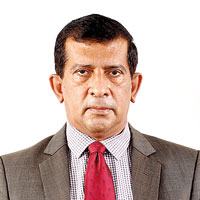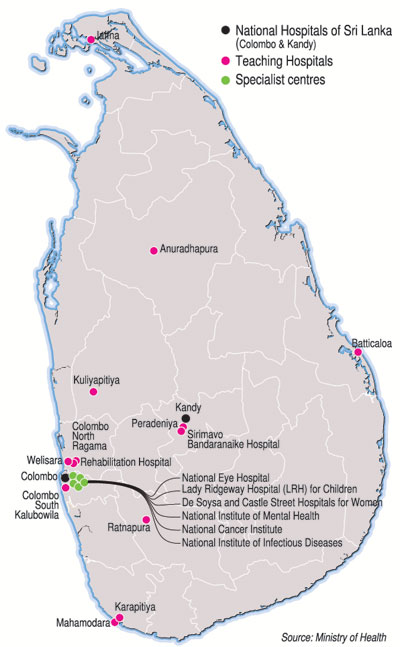News
Urgent need to stagger retirement age for medical specialists to prevent collapse of state hospital system
View(s):Domino effect as specialist pipeline may dry up and floodgates open for brain drain, as retirement at 60 also comes into the picture
By Kumudini Hettiarachchi
The way to ward off a major ‘domino’ effect which could possibly lead to the collapse of the state health system due to recent developments and this week’s Budget decision on retirement, is to stagger the retirement process.

Prof. Dileep De Silva
This advice comes from the former Health Ministry National Focal Point for Human Resources (HR), Dr. Dileep De Silva, who is currently Chair Professor of Public Dental Health and Director of Career Guidance of the University of Peradeniya. He had been Head of HR at the ministry till December 31, 2021 (last year).
With the Sunday Times receiving numerous calls about the impending danger to the state health sector, we contacted Prof. De Silva on the domino effect of the recent situation.
The domino effect is the cumulative effect produced when one event initiates a succession of similar events. The Sunday Times heard of serious concerns in the state health sector over a massive brain-drain of medical specialists due to the dire economic straits the country is in and also the inability of people to pay for children who may be studying abroad due to tough dollar-restrictions on the part of the authorities.
The Sunday Times also learns that the 60-year retirement plan may aggravate the situation.
Giving the backdrop, Prof. De Silva says that Sri Lanka is one of “very few” countries across the world which provide free post-graduate medical education for its specialists. It is also one of the few countries where medical education (to gain the MBBS – Bachelor of Medicine, Bachelor of Surgery) is free. Since 1978, the post-graduate degree awarding institution for doctors has been the Post-Graduate Institute of Medicine (PGIM).
While there are the main specialties of Medicine; Surgery; Obstetrics & Gynaecology; and Paediatrics; there are also more than 50 other specialties and sub-specialties. These specialties are Ophthalmology (eye), ENT (ear-nose-throat), dermatology and psychiatry to name a few. 
These medical specialists work for the Health Ministry, as academics in the universities, in the security forces (the Police, army, navy and air force) and in the private sector.
Stressing that all his data are evidence-based, Prof. De Silva points out that 90% of the medical specialists are in ‘dual employment’ working for both the state and private sectors.
Here are the statistics that this veteran with numbers provides:
There are around 2,300 medical Consultants who are PGIM Board certified in the Ministry of Health.
The process of training as a medical specialist is – after getting through the MD Part I of a specific specialty, a trainee serves as Registrar of that specialty for 2-3 years, the time period being dependent on the specialty. Then he/she sits for his/her MD Part II and, if successful, serves as a Senior Registrar (SR), once again working for 1-2 years depending on the specialty. Thereafter, he/she would go abroad for his/her mandatory training for about 1-2 years and return to Sri Lanka to be appointed as a Consultant.
This group of Consultants consists of around 240-260 per year from various specialties.
A majority of these trainees receive their mandatory foreign training in the United Kingdom (UK); the balance in Australia; and a few in other countries including India.
Now come the disturbing data from Prof. De Silva who knows the situation in and out.
Usually, in earlier years, the trend has been for about 5-10% of these post-graduate trainees to stay behind in those countries and not return to Sri Lanka. So, if 240 go abroad for training, about 15-20 will not return.
However, this year (up to August 1, 2022), only 50-60 of these trainees have returned, with the others not coming back, which is a disturbing trend.
Predicting a gloomy picture, Prof. De Silva says that he believes that in the remaining months of the year, only fewer than 100 are expected to return. This means that earlier where Sri Lanka lost only 15-20, this year’s trends indicate that the country would lose more than 80-100 Consultants.
The Sunday Times understands that the next issue is Consultants leaving Sri Lanka’s shores using the government’s ‘open’ invitation to do so, with the provision of the facility of no-pay leave for five long years, without losing their seniority locally.
“Already there are about 80 applicants for this facility,” says Prof. De Silva, explaining that 20-30 Consultants have also taken the leave due to them and headed abroad. They are likely to return after their leave runs out and then take advantage of the five-year, no-pay leave facility.
Having looked closely at ‘Consultant migration’, he says that the outflow tallies with the UK’s job intake cycle which occurs in February and August each year.
Next Prof. De Silva looks at the retirement age being reduced to 60 years of age in the public sector and how it would impact on the state health sector. The data in hand show that there are between 180-200 Consultants over 60 years of age currently and if the retirement condition is implemented on December 31, 2022, the state hospital system would lose all of them.
| Extend retirement to 63 years until system balances out Human Resources Specialist Dr. Dileep De Silva’s recommendation and solution are that the way forward is to extend the retirement age of Consultants to 63 to avert an immediate crisis. “Then the system will balance itself out – otherwise with one swipe, there could be severe challenges to Sri Lanka’s much-praised state hospital system,” he adds.
| |
| Sri Lanka will lose around 300 specialists this year alone if plans are not revisited; huge loss from base of 2,300What would be the toll of the different factors on the state health system? The brain-drain and the retirement by 60 years would cause the loss of around 300 Consultants by the end of this year, cautions Prof. Dileep De Silva, reiterating that from a base of 2,300 Consultants this would be a “huge loss”. This is why he is suggesting a staggered retirement like what was offered to bankers in November 2021, to lessen and dilute the hit on the system. Another factor, the Sunday Times learns is that the peers of these Consultants who are in academia (Medical Faculties of universities) face retirement only at 65 years. Meanwhile, Prof. De Silva says that usually when trainees go for their post-graduate stint abroad, they are provided an allowance of £ 2,700 each per month if they are heading to the UK and an equivalent amount depending on the country, if they have not been able to secure a job which pays them during the training. Currently, this allowance has been suspended due to the government’s foreign exchange crisis. Those who cannot find themselves a job cannot go for their training abroad, which in turn, limits the number training as Consultants. Therefore, on one hand, Sri Lanka has partially blocked the pipeline supplying Consultants, while on the other it has opened the floodgates with the five-year, no-pay leave facility. Aggravating the matter, now the Consultants would mandatorily be retired at 60 years, he says. The negative effect of losing around 300 Consultants from 2,300 would be “unbearable” for the state hospital system. It would create a cascade effect which could easily make the sector collapse, impacting heavily on the patients, stresses Prof. De Silva. The major sufferers of these issues would be the big hospitals like the National Hospital of Sri Lanka (NHSL), Colombo and the Kandy National Hospital; and the Teaching Hospitals. Other victims would be centres of excellence such as the National Eye Hospital, Colombo; the Lady Ridgeway Hospital (LRH) for Children, Colombo; the De Soysa and Castle Street Hospitals for Women, Colombo; the National Institute of Mental Health, Angoda; the National Cancer Institute, Maharagama; and the National Institute of Infectious Diseases, Angoda. Another danger signal comes from this expert – as these are also end-stations and heavily into teaching of medical students and post-graduate trainees, such clinical teaching programmes could also face some jeopardy. Even though younger Consultants could be sent to these end-stations from out-flier hospitals, there could be a lacuna, with the Directors of those hospitals refusing to release them until replacements arrive. Ironically and sadly, Prof. De Silva points out that most Consultants who are leaving Sri Lanka are going for “under-employment” which does not match their high-level of training and skill-sets. His logic is that even though the government provided the five-year, no-pay leave facility to attract foreign exchange, in the case of doctors this will not happen. They will utilise the dollars they earn in those countries to fund their children’s education etc. According to him, the usual pattern is that if a male doctor looks for greener pastures, he may not take his family but send the dollars back and return home after about 4-5 year. But if a woman doctor goes abroad, the chances are that the whole family will relocate in that country and the dollars will stay there without being sent back to Sri Lanka. Once again the numbers tell a tale – 83% of specialists who qualified in microbiology through the PGIM since the new millennium (21st century or since 2000) were women. 65% of dermatologists (skin specialists) were also women.
|
The best way to say that you found the home of your dreams is by finding it on Hitad.lk. We have listings for apartments for sale or rent in Sri Lanka, no matter what locale you're looking for! Whether you live in Colombo, Galle, Kandy, Matara, Jaffna and more - we've got them all!

